
Smite Past Simple, Simple Past Tense of Smite Past Participle, V1 V2 V3
Verb [ edit] smite (third-person singular simple present smites, present participle smiting, simple past smote or smited or (obsolete) smit, past participle smitten or smote or smited or (obsolete) smit) ( archaic) To hit; to strike . 1611, The Holy Bible, [.] ( King James Version ), London: [.]
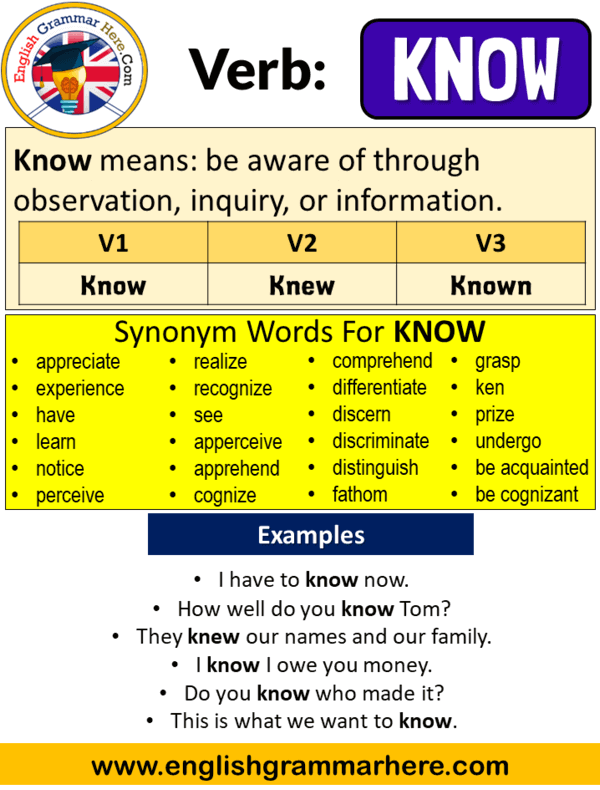
Smite Past Simple Simple Past Tense Of Smite Past Participle V1 V2 V3
The past tense of smite is smote or obsolete smit. Table Of Contents: smote or obsolete smit. The Forms of Smite. Conjugate Smite. Smite in Present Simple (Indefinite) Tense. Smite in Present Continuous (Progressive) Tense. Smite in Present Perfect Tense. Smite in Present Perfect Continuous Tense.

the past tense of smite r/FireEmblemHeroes
The past tense (past participle) form of "smite" is "smite." The infinitive of the word form is "smite." The present participle form is "smiting." The past tense form is "smite" and past participle form is "smite." Understanding verb tenses The general grammar rules that govern past tenses are as follows.
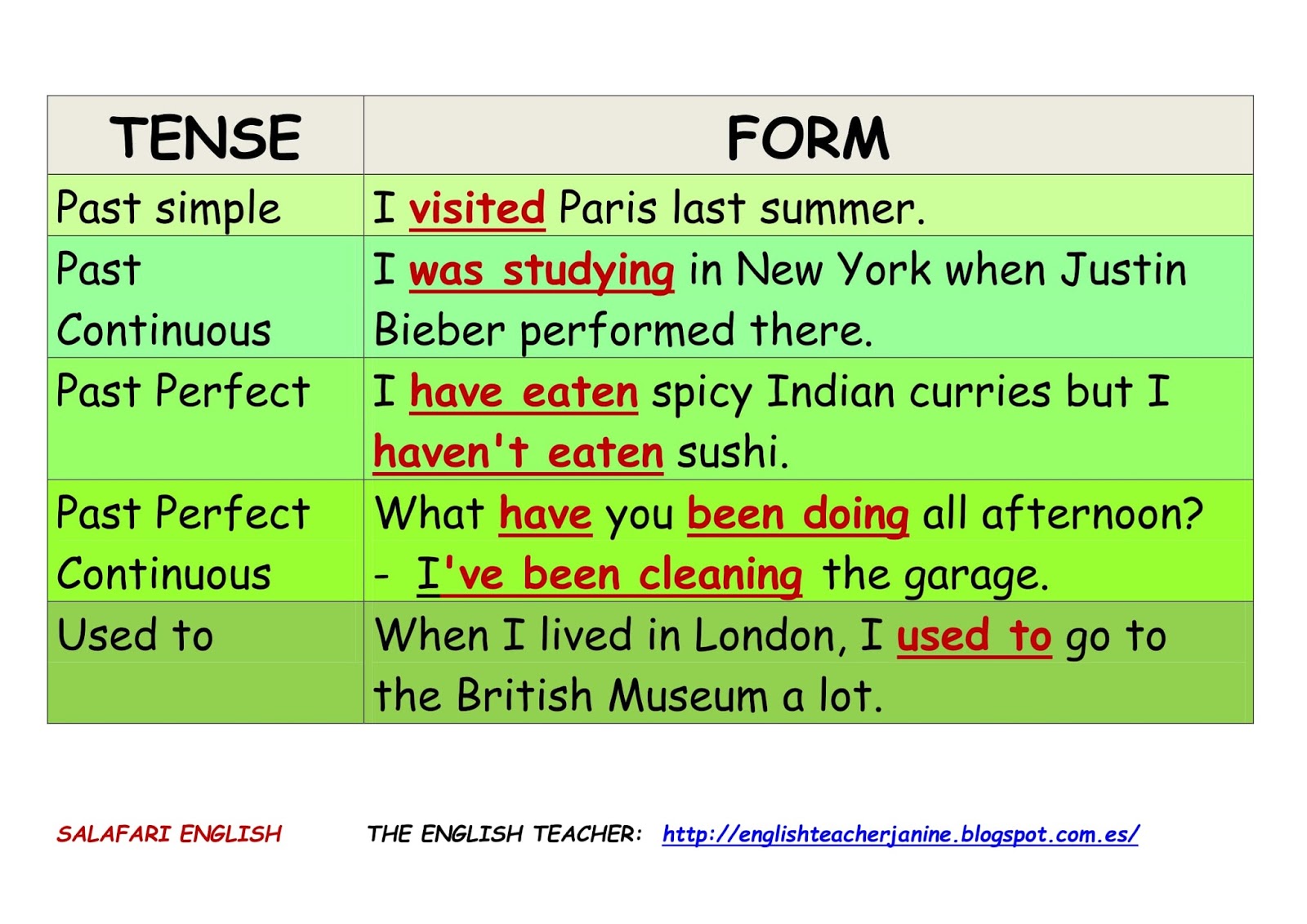
Past Tense English Grammar 9ED
English verb conjugation to smite to the masculine. Irregular verb: smite - smote - smitten, smit.

Forsmite Past Tense Verb Forms, Conjugate FORSMITE
past tense of smite is smote or obsolete smit. Smite verb forms Conjugation of Smite Simple / Indefinite Present Tense He/She/It smites . I smite. You/We/They smite. Present Continuous Tense He/She/It is smiting. I am smiting. You/We/They are smiting. Present Perfect Tense He/She/It has smitten or smited. I have smitten or smited.

Smite past simple simple past tense of smite past participle v1 v2 v3
Smote is the past tense form of the verb smite, which is most frequently used to mean "to strike sharply or heavily especially with the hand or with something held in the hand," or "to kill or severely injure by striking in such a way."

Past Tense of Smite Smitten with the Past Tense ESLBUZZ
The verb smite has two past tense forms: smote and smitten. Smitten is the more common one, and it is usually used to mean that someone is captivated or infatuated with a thing or another person as in "he was smitten with his new puppy."

SMITE Season 2 Gods of Future Past (Updated Review) OnRPG
Conjugation verb smite smite Infinitive to smite Preterite smote Past participle smitten Model : write Auxiliary : have, be Other forms: smite oneself / not smite Contractions Advertising Indicative Present I smite you smite he/she/it smites we smite you smite they smite Preterite I smote you smote he/she/it smote we smote you smote they smote
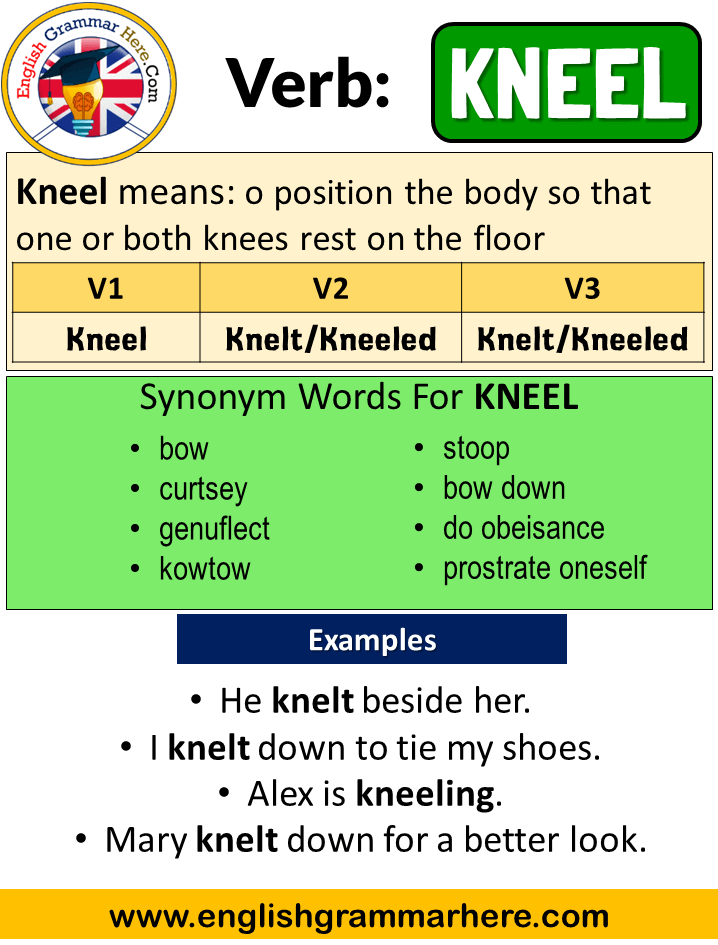
Smite Past Simple Simple Past Tense Of Smite Past Participle V1 V2 V3
verb /sməʊt/ /sməʊt/ past tense of smite Definitions on the go Look up any word in the dictionary offline, anytime, anywhere with the Oxford Advanced Learner's Dictionary app. Check pronunciation: smote Definition of smote verb in Oxford Advanced Learner's Dictionary.

What is the Past Tense of Smite? The Word Counter
A secondary definition is, "to kill or severely injure by smiting" or "to attack or afflict suddenly and injuriously". Overall, there are seven definitions of the word "to smite", both in transitive and intransitive forms. The intransitive form is defined as, "to deliver or deal a blow with or as if with the hand or something held".
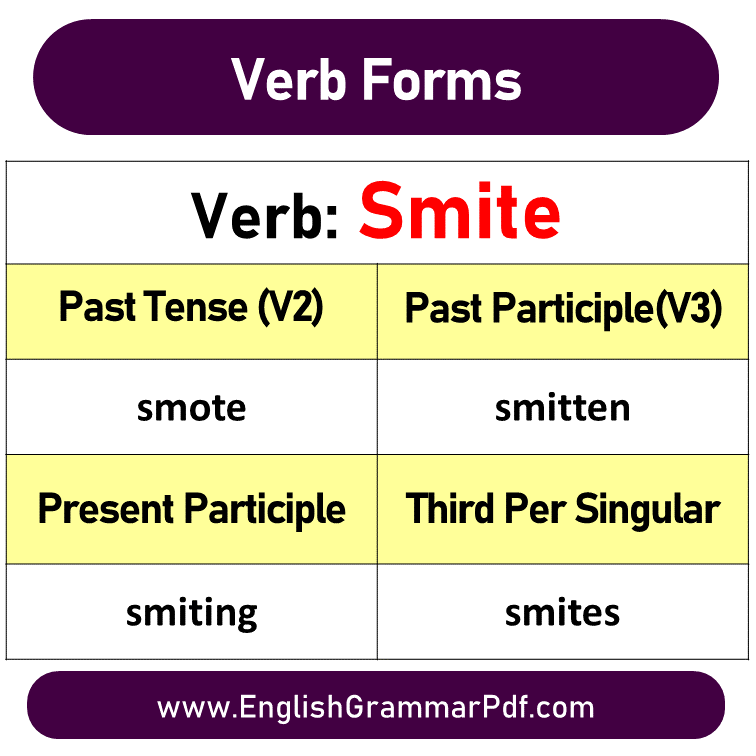
Smite Past Tense, Present and Future Conjugations, Smite V1 V2 V3
Smote is the past tense of smite . Collins COBUILD Advanced Learner's Dictionary. Copyright © HarperCollins Publishers smote in American English (smoʊt ) verb transitive, verb intransitive pt. & alt. pp. of smite Webster's New World College Dictionary, 4th Edition. Copyright © 2010 by Houghton Mifflin Harcourt. All rights reserved. Word Frequency
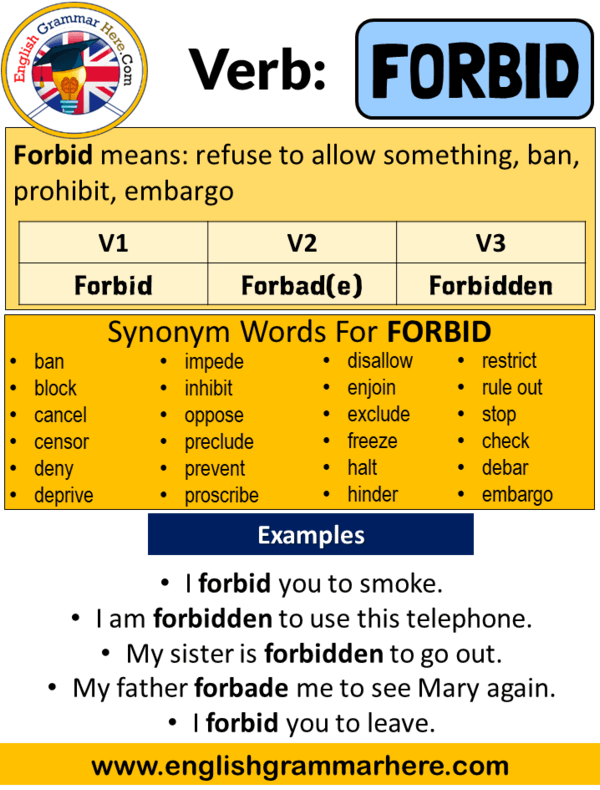
Smite Past Simple Simple Past Tense Of Smite Past Participle V1 V2 V3
past participle: (to) smite smiting smitten: definition: in Spanish in French in Italian: Open All Desktop View. Indicative. present.

Past Tense Of Smite Smote or Smited? (Pronunciation & Usage)
Simple Past Tense The simple past tense of "smite" is "smote." This tense is used to describe an action that happened at a specific time in the past. For example, "He smote the enemy with his sword." Past Continuous Tense The past continuous tense of "smite" is "was/were smiting."
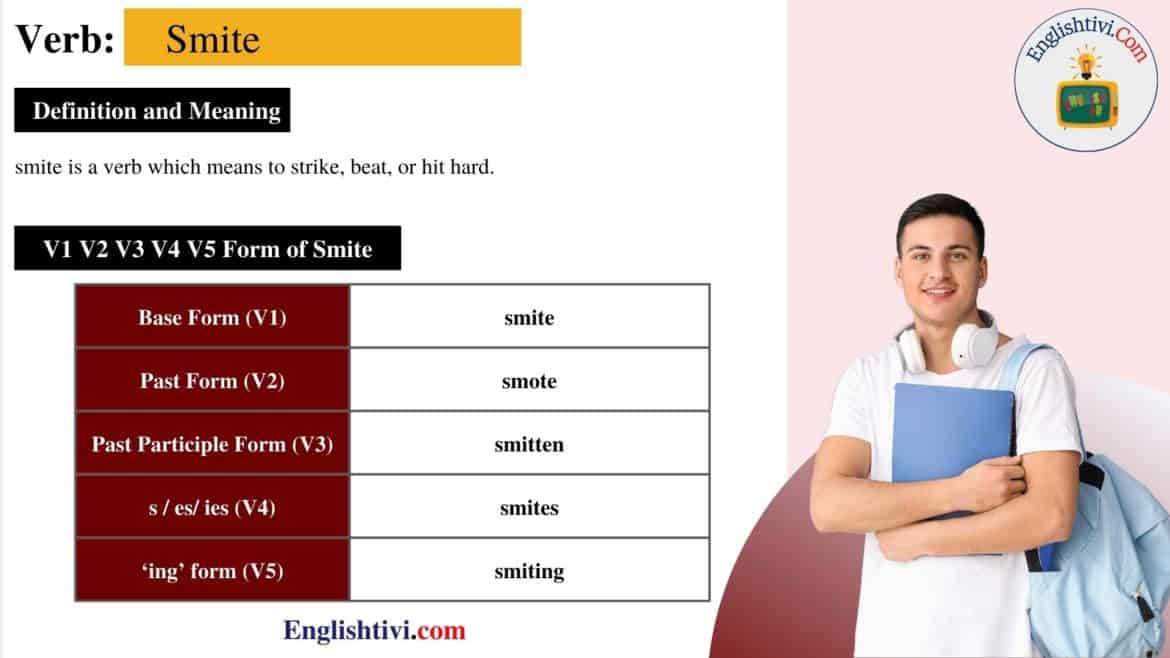
Smite V1 V2 V3 V4 V5 Base Form, Past Simple, Past Participle Form of
When using smote, it is important to remember that it is the past tense of the verb "smite," which means to strike or hit forcefully. Therefore, smote should be used to describe an action that has already occurred in the past. It is typically used in a poetic or archaic context, adding a sense of drama and intensity to the sentence.
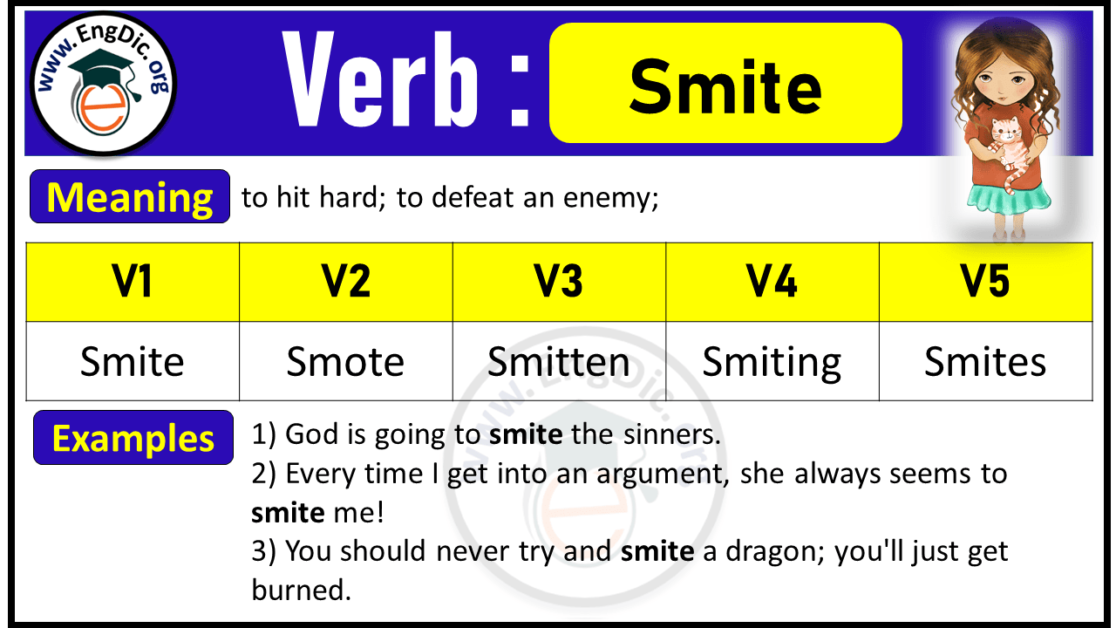
Smite v1 v2 v3 Archives EngDic
What Is The Past Tense Of Smite? Tell me, how many irregular verbs do you know? You intend to talk about the verb run or the verb crochet, don't you? Here, we will add one more verb for your collection: smite. So what is the past tense of smite? It's SMOTE. You alter "I" (in the base form) for "I", in short. It can be spelled S-M-O-T-E.

Smite past simple simple past tense of smite past participle v1 v2 v3
The past tense of the verb "smite" is "smote", and the past participle is "smitten". Verb Tenses Past simple — smite in past simple smote (V2) . Future simple — smite in future simple is smite (will + V1) . Present Perfect — smite in present perfect tense is smitten (have/has + V3) .